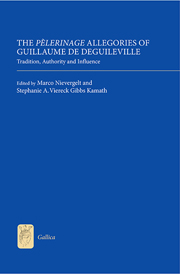Book contents
- Frontmatter
- Contents
- List of Illustrations
- List of Contributors
- Acknowledgements
- Abbreviations
- Introduction
- Part I Tradition
- 1 The Pèlerinage corpus: A Tradition of Textual Transformation across Western Europe
- 2 Manuscrits à voir, manuscrits à lire, manuscrits lus: les marginalia du Pèlerinage de Vie Humaine comme indices de sa réception médiévale
- 3 Rewriting Joseph in the life of christ: The Allegory of the Raptor-Thieves in the Pèlerinage de Jhesucrist
- Part II Authority
- Part III Influence
- Bibliography
- Index
1 - The Pèlerinage corpus: A Tradition of Textual Transformation across Western Europe
from Part I - Tradition
Published online by Cambridge University Press: 05 December 2013
- Frontmatter
- Contents
- List of Illustrations
- List of Contributors
- Acknowledgements
- Abbreviations
- Introduction
- Part I Tradition
- 1 The Pèlerinage corpus: A Tradition of Textual Transformation across Western Europe
- 2 Manuscrits à voir, manuscrits à lire, manuscrits lus: les marginalia du Pèlerinage de Vie Humaine comme indices de sa réception médiévale
- 3 Rewriting Joseph in the life of christ: The Allegory of the Raptor-Thieves in the Pèlerinage de Jhesucrist
- Part II Authority
- Part III Influence
- Bibliography
- Index
Summary
Guillaume de Deguileville's four French Pèlerinage allegories – PVHl, PVH2, PA and PJC – are the starting point for various forms of literary rewriting and reconfiguration, transmitted in manuscript and print between the late fourteenth and the early seventeenth centuries. The resulting Pèlerinage corpus transcends linguistic boundaries, evolves in highly different social and literary contexts and encompasses a wide array of very diverse literary adaptations. Its complex history thus offers us a unique perspective on late medieval processes of textual transformation and adaptation across Europe. In what follows, we propose to explore the parameters of this European history of textual transformation in two main stages. First, we discuss the wide range of authorial signatures that appear both within the texts of the Pèlerinage corpus and in the paratextual matter of manuscripts and early printed editions. Second, we address a limitation in the circulation of this corpus; examining the absence of Pèlerinage translations in Italy as a special case, we suggest a way in which our study of authorial signatures could provide a rationale for this limitation.
- Type
- Chapter
- Information
- The Pèlerinage Allegories of Guillaume de DeguilevilleTradition, Authority and Influence, pp. 25 - 46Publisher: Boydell & BrewerPrint publication year: 2013



